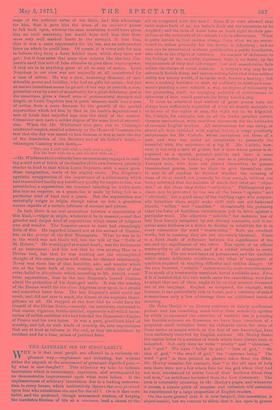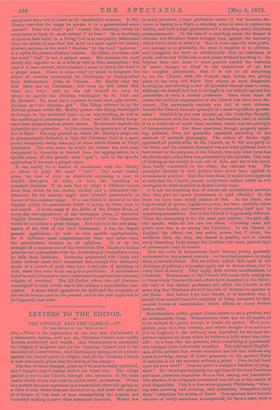THE LITERARY SIN OF SINGULARIIT.
WHY is it that most people are affected in a curiously un- pleasant way,—unpleasant and irritating, but without either the anguish or the solacement of great and dignified pain,— by what is new-fangled ? This adjective we take to indicate innovation which is unnecessary, capricious, and accompanied by no demonstrable improvement upon what went before. Is the unpleasantness of arbitrary innovation due to a lurking conserva- tism in every breast, which instinctively throws the onus pro bandi upon him whosubstitutes the newfor the old ? Or is it that mere habit, and the profound, though unreasoned wisdom, of keeping the inevitable friction of life at a minimum, lend a charm to
old as compared with the new ? Even if it were allowed that habit makes fools of us, yet habit's fools are too numerous to be despised ; and the fools of habit have as much right to their pre- judices as the coxcombs of the schools to their affectations. What is quite certain is, that sudden change from what we are accus- tomed to, unless pointedly for the better, is fidgetting ; and no man can be pronounced without qualification a public benefactor, who adds to the fidgets of existence. An amount of deference to the feelings of the majority, rigorously limited, no doubt, by the requirements of duty and self-respect. but still considerable, falls within the claims of social courtesy. A lawyer's wig may be an extremely foolish thing, and anyone setting forth that it has neither utility nor beauty would, if be spoke well, deserve a hearing ; but were a sucking barrister to start up suddenly in court and com- mence pleading a cue without a wig, no degree of rationality in the proceeding itself, no engaging audacity of countenance or splendour of hair, would preclude his being voted a prig.
It must be admitted that authors of great genius have not always been sufficiently regardful of what we stoutly maintain to to be one of the rights of man, the right not to be fidgetted. Mr. Carlyle, for example, has in all his books paraded certain German mannerisms, with merciless unconcern for the habitudes of common English readers. All substantives, for one thing, or almost all, were initialed with capital letters, a usage peculiarly unfortunate for Mr. Carlyle, whose metaphors are those of a poet, and who was under no temptation to personify the beautiful with the assistance of a big B. Mr. Carlyle, how- ever, is not only a man of genius, but a man whose genius is re- cognised as a special, personal quality, and there is some fairness therefore in looking upon him as a privileged person. Younger men, who have not proved themselves to possess transcendent genius, have no right to give themselves airs. It may in all candour be doubted whether the meaning of some of these would not generally be clear enough, without our being informed that the realities of which they treat are "objec- tive," or the ideas they define "subjective." Philosophical pre- cision may be promoted by the use of the terms "egoistic" and "altruistic," but a good many of the budding sages who perpetu- ally introduce them might make shift with our old-fashioned friends, " selfish " and "unselfish." Occasionally the pedantry takes the form of fastidious exclusiveness put in force against a particular word. The adjective "reliable," for instance, has of late been fiercely ostracised by our literary coxcombs, and it re- quires some boldness in a writer to decline to substitute for it in every connection the word "trustworthy." Both are excellent words, but in meaning they are not absolutely identical. There is a faint shade of difference between the significance of the one and the significance of the other. You speak of an official trustworthy in all situations, and of a soldier reliable in every emergency. The one word leans on permanence and the qualities which create deliberate confidence, the other is suggestive of qualities required in startling difficulty and sudden danger. Of the two, however, " reliable " strikes us as the more comprehensive. You speak of a trustworthy merchant, but of a reliable man. Even if it is insisted that the two words mean the same thing, we rause to admit that one of them ought to be on that account drummed out of the language. English, as compared, for example, with German, is not particularly rich in terms, and a variation of sound is sometimes only a less advantage than an additional touch of meaning.
Mr. John Morley is no literary coxcomb or dainty academical pedant, and has something much better than crotchetty egotism by which to command the attention of readers ; but in perusing his forcible volumes on Rousseau, we have been conscious of a perpetual small irritation from his elaborate scorn for some of those modes or usages which, to the beat of our knowledge, have been uniformly observed by English authors. Mr. Morley denies the capital letter to a number of words which have always been so honoured. Not only does he write " trinity " and " christian," but "god." We have "belief in god," "love of god," "the idea of god," "the word of god," the "supreme being." The word " god " is thus printed in phrases taken from the Bible. Mr. Morley remarks, for example, that "in the old ages of holy men there were not a few whom love for the god whom they had not seen, constrained to active love of their brethern whom they had seen," an antithesis borrowed from the New Testament. The term is constantly occurring in Mr. Morley's pages, and whenever it occurs, a minute prick of surprise and irritation will certainly be experienced by a large proportion of English readers.
On the mere ground that it is new-tangled, this innovation is objectionable, but we venture to affirm that it lies open to grayer
exceptions than can be based on its uncalled-for newness. Is Mr. Morley sure that the usage he adopts is in a grammatical sense correct? Does the word " god " convey the meaning which, in some cases at least, he must intend it to bear ? He is doubtless of opinion that belief in a living God is so completely obliterated from the minds of men that the word is a mere cipher for certain abstract notions, as the word " freedom " or the word " patience " is a cipher for certain abstract notions. He infers, therefore, that the word " God " is not a proper name. His premiss, we need hardly say, appears to us a wild as well as false assumption ; but even if it were correct, there remains a sense in which the word is a proper name. There is none other by which to designate the object of worship reverenced by Christians, as distinguished from Mahometans, Jews, or Chinese. Mr. Morley may say that there are no Christians ; but even he will admit that there once were ; and he has left himself no term by which to specify the Divinity worshipped by St. Paul and St. Bernard. He mast have recourse to some such ugly circum- locution as "the christian god." The Being referred to in the Biblical phrases which Mr. Morley quotes—the Being worshipped in Europe in the medimval time—is, on any showing, as real as the mythological personages of the Iliad; and Mr. Morley recog- nises their designations as proper names. He does not degrade his Aphrodite into aphrodite. In like manner, he speaks not of mars, but of Mars. The only ground on which Mr. Morley's usage can be grammatically defended is that the Christian God is a more purely imaginary entity than any of those which Homer or Virgil celebrated. The only name by which the former has ever been designated in literature is derived from the appropriation, in a specific sense, of the generic term "god "; and in its specific application it becomes a proper name.
It can hardly be a matter of conscience with Mr. Morley to refuse to print the word " God." The mind cannot grasp the idea of duty as absolutely enjoining a man to exhibit disrespect of what, to him, are vanishing or vanished illusions. If he was free to adopt a different course from that which he has chosen, civility and a reasonable con- sideration for his readers might have pleaded persuasively in favour of the common usage. It is one which is endeared to the English public by associations which it is not, we trust, cant to call sacred. It is the usage of the Bible, of the Prayer-Book, of every-day correspondence, of the newspaper press, of universal English literature. To dismiss the word "God" from literature would be to initiate a great change. Not only is it the sole desig- nation of the God of the New Testament ; it has the largest generic application, as well as this specific appropriation, for it indicates more comprehensively than any other term the monotheistic element in all religions. It is on the strength of a common use of this word that Her Majesty's Indian subjects can remonstrate with the Archbishop of Canterbury when he calls them heathens. Everyone acquainted with Greek and Latin authors must have remarked that, though they ordinarily speak of a crowd of gods, they have a way also of speaking of God, when they refer to no one god in particular. A spontaneous belief in one God seems to have constituted the natural and universal religion of mankind. The All-Father whom the old Germans worshipped in their woods was in like manner a monotheistic con- ception. A usage which appeals to the faith and the sympathy of the whole human race in the present and in the past ought not to be flippantly cast aside.



































 Previous page
Previous page